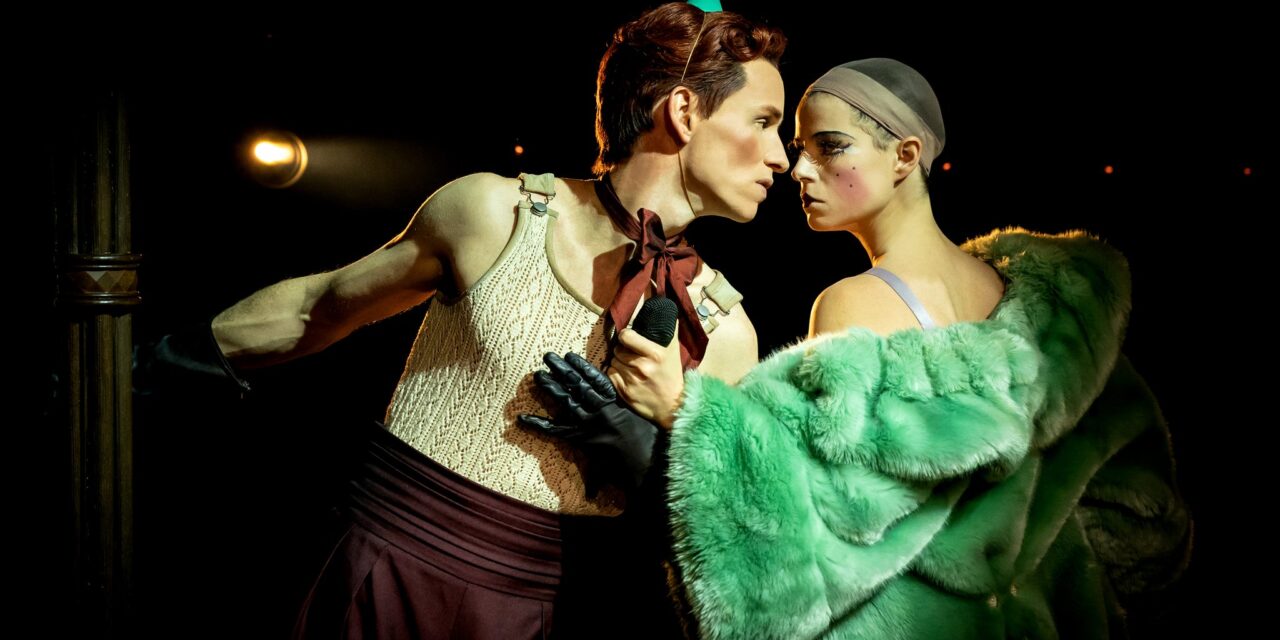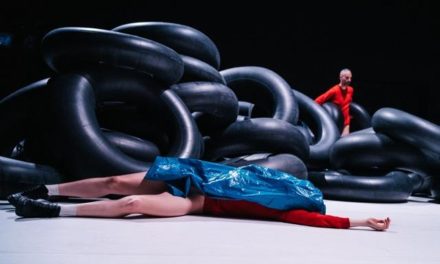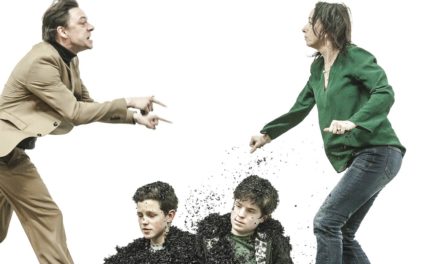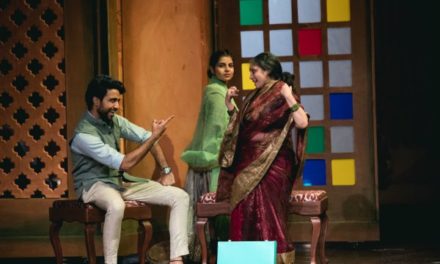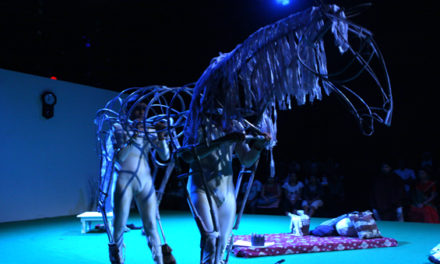Willkommen, bienvenue, welcome! Come on in: we need, after all, some respite from a world in turmoil. So why not head to a corner of the West End where life is beautiful, and turn to Cabaret, the classic musical by the creative trio of John Kander (music), Fred Ebb (lyrics), and Joe Masteroff (book)? It is apt that the opening number “Wilkommen” should ask us to leave our troubles outside, because Rebecca Frecknall’s extraordinary production is practically a trouble-free zone: her immersive staging revives this iconic 1966 work with jaw-dropping finesse and electrifying performances by a star-studded cast.
Our destination is as much a club as a theatre. Rechristened as the Kit Kat Club, the Playhouse Theatre has been redesigned to accommodate an in-the-round stage, cabaret-style seating, and niche areas around the bars for an interactive pre-show ritual. And this spatial expansiveness pays off big time, as both the reimagined foyer and auditorium immediately envelop the audience into a golden, tasseled world marked by its decadent spirit. The pre-show entertainment, featuring live music and a company of serpentine dancers both on stage and off, effortlessly situates us in the eponymous setting.
In Frecknall’s ambient interpretation, the Kit Kat Club, where Cabaret is largely set, proves its worth as a site of lush grotesquery and endless indulgence. As its Master of Ceremonies, or Emcee, Eddie Redmayne cuts an enchantingly distorted figure: his face overtaken by heavy makeup, his head supporting a skew party hat, and his body snared in self-inflicted contortions, Redmayne wavers suggestively between a puppet and an acrobat. His child-like, angular intonation feeds into this skeletal aesthetic, which culminates in a character at once ethereal and chillingly raw. When he performs “Money” with the rest of the Kit Kat ensemble, Redmayne praises the filthy lucre as an angel of death cut off from earthly morality: he is dressed in a beguiling skeleton suit adorned with glittering jewels, tempting us to join him in the underworld.
Of course, at the heart of the proceedings overseen by Emcee is the English chanteuse Sally Bowles, performed with ravishing precision by Jessie Buckley. In Buckley’s excellent rendering, Sally’s charm comes mixed with grit and teeth, and the result is a flesh-and-blood portrayal of a character torn by competing desires. Sporting a bob-cut wig and a green fur coat, Buckley owns the stage without dominating it, injecting her scenes with just the right dose of show-stopping allure.
Cabaret is chiefly concerned with Sally’s tempestuous involvement with the American novelist Clifford Bradshaw, whose initial fascination with Berlin’s hedonism in the final years of the Weimar Republic gets supplanted by his growing worry over the rise of the Nazis. As Bradshaw, Omari Douglas presents an open-eyed, soft-spoken writer for whom Sally offers an unexpected but welcome framework for settling down in life. While Douglas’s boyish delicacy constitutes an intriguing counterpoint to many of the characters’ moral seediness, it also makes his chemistry with Buckley’s whirlwind Sally suggestively uneven—though at the expense of some persuasiveness.
Cliff’s and Sally’s paths also cross with those of their landlady Fräulein Schneider and her Jewish suitor Herr Schultz, whose maturing romance gets aborted by the escalating Antisemitic sentiments around them. Liza Sadovy and Elliot Levey are magnificent in these tender and emotionally intricate parts. Their pineapple duet in “It Couldn’t Please Me More” is particularly arresting in its romantic energy and humorous undertow, and serves as a fitting episode of comic relief before the end of the first act brings to a crescendo the worsening socio-political climate.
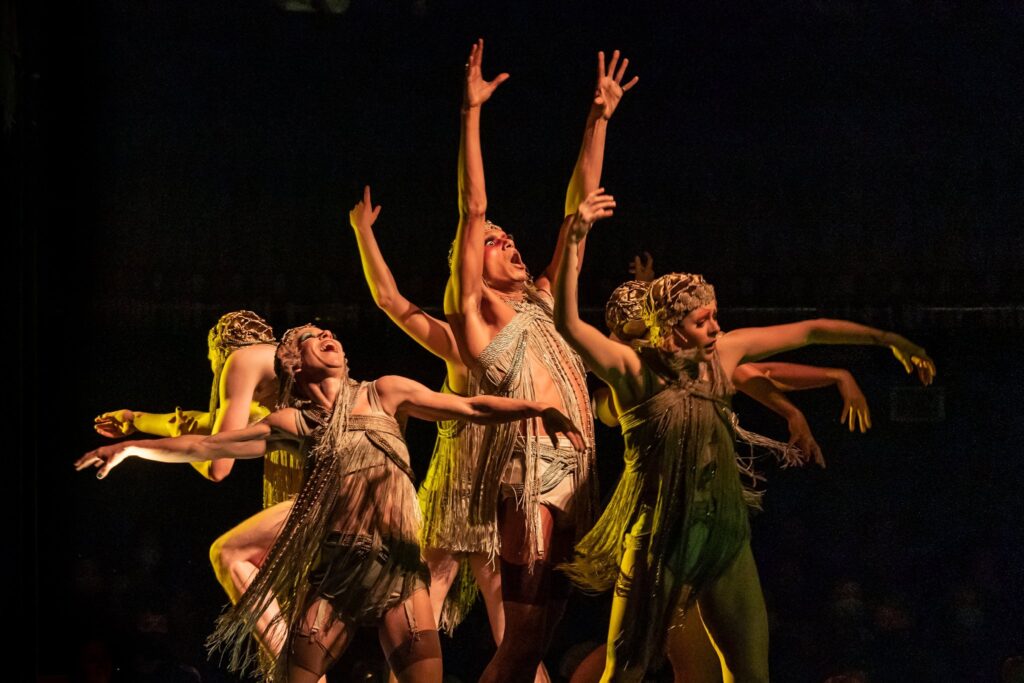
The cast of Cabaret at the Playhouse Theatre. Photo: Marc Brenner
Frecknall’s staging is acutely attentive to the continuity between the scenes, but also displays an instinctive awareness of when to play big and when to go small. While Tom Scutt’s set design (extending to the many details of the building itself) leaves the circular stage mostly bare, a revolve and its elevated platforms enhance Julia Cheng’s meticulously agile choreography. The modest size of the stage not only renders the action starkly intimate, but also draws attention to the elegant ways in which the actors inhabit certain corners of the house, including during their entrances and exits. Isabella Byrd’s razor-sharp lighting and Scutt’s dazzlingly edgy costumes leave their essential imprint on every single scene.
The Kit Kat ensemble itself is a wonderfully degenerate mix of colorful personalities, each evoked by distinct choices in makeup and costume. Their sexual and aesthetic fluidity is complemented by a solid sense of differentiated characterization. Indeed, one of the many strengths of the production lies in its ability to infuse the historical context of its story with a muted but pulsing contemporary sensibility, especially in terms of design and choreography. While we never doubt that we are in the world of the late Weimar Republic, it feels as though that world has come into our own and adapted itself accordingly, rather than the other way around.
The production also makes the smart decision to underline the tonal and narrative shift in the piece by dimming the razzmatazz in its second act. In this latter portion, almost all the characters—including Sally—appear in somber, brown suits, trying to inhabit a society that is becoming hellbent on eradicating individuality and any deviance from norm. Buckley’s final performance in the titular number “Cabaret,” majestically stripped down but blazingly visceral, plays into this understanding by pitching itself as an elegy for a bygone era. And during the heartbreaking “Finale,” we see everyone forming a circular queue, colorless and downcast, heading into a darkness far, far away from the glamor of Kit Kat Club.
Roaring in its ambition and sinuous in its panache, this Cabaret asserts itself as a landmark production of a work whose cultural relevance and theatrical power remain undimmed. It’s nothing less than a privilege to be transported by this stellar cast and masterful team into a realm of wicked pleasures and deferred dreams. Unforgettable.
This post was written by the author in their personal capacity.The opinions expressed in this article are the author’s own and do not reflect the view of The Theatre Times, their staff or collaborators.
This post was written by Mert Dilek.
The views expressed here belong to the author and do not necessarily reflect our views and opinions.

